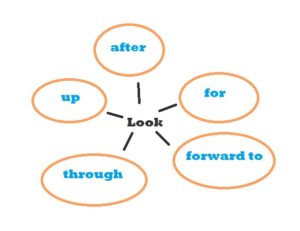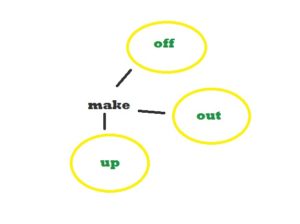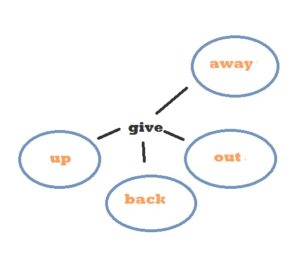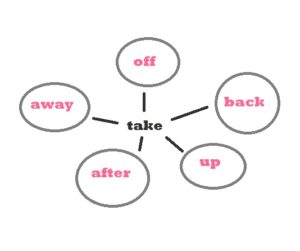be in / out – быть (не) дома
be on – идти (о фильме)
be over — заканчиваться
come back – вернуться
come on — давай! иди! живей! Ну же!
go on – продолжать
look for — искать
look after — присматривать
look like — выглядеть как (быть похожим)
get on/off — сесть / сойти (на автобус, поезд)
get on with — ладить с кем то
get together — собраться вместе
turn on/off — включить / выключить
turn up/down — сделать погромче / потише
put on — одеть
take off — снять
try on – примерять
make up — придумать
Фразовые глаголы для начинающих. Упражнения. Часть 1
Exercise 1. Вспомните значения фразовых глаголов (9):
be in / out
be on TV
be over
come back
come on
go on
look for
look after
look like
* * *
Exercise 2. Переведите, обращая внимание на выделенные сочетания.
Is he in?
He is out.
The lesson was over.
What is on TV tonight?
I will come back at 5 o’clock.
Come on! We need to hurry.
Go on reading.
What are you looking for?
I will look after your children. Don’t worry.
You look like your mother.
* * *
Exercise 3. Complete the sentences using the right phrasal verb and translate them.
When I came home, mother … in.
I called him, but he … out.
Father will leave tomorrow and … back on Sunday.
We are already late. … on!
People must … after their pets.
Can you help me to … for my cat?
The party will … on until 5 o’clock in the morning.
The lecture … over and all the students left.
What … on at the cinema tonight?
Who do you … like?
Exercise 4. Translate the sentences into English. Use the phrasal verbs.
Продолжай, я тебя слушаю.
Его сейчас нет дома.
Когда ты вернешься?
Вчера по телевизору шел интересный фильм. (There was …)
Ты похож на мать или на отца? (… or your father?)
Кого ты ищешь?
Скорей! Мы опаздываем.
Нужно присматривать за маленькими детьми. (One must …)
Лето закончилось.
Фразовые глаголы для начинающих. Упражнения. Часть 2
Exercise 5. Вспомните значения фразовых глаголов (9):
get on/off
get on with
get together
turn on/off
turn up/down
put on
take off
try on
make up
* * *
Exercise 6. Переведите, обращая внимание на выделенные сочетания.
Get on bus 9 and get off at the next stop.
Turn on / off the light, please.
Turn up / down the music, please.
It is cold outside. Put on the sweater.
Take off your boots before you come in.
Make up a dialogue, please.
I get on with my brother very well.
I think I will try the shoes on. I like them.
Let us get together on Monday.
* * *
Exercise 7. Complete the sentences using the right phrasal verb and translate them.
The bus is full. We can’t … on.
Your hands are cold. … your gloves on.
I can’t hear the TV. Can you … it up?
The music is too loud. Can you … it down?
I … on with my neighbours. They are very friendly.
I … on a jacket but it didn’t fit me (плохо сидел).
It was warm, so I … off my jacket.
Can you … the lights on? It is so dark in the room.
What he told you wasn’t true. He … it all up.
They … together and had a party.
* * *
Exercise 8. Translate the sentences into English. Use the phrasal verbs.
Сядьте на поезд на станции Виктория (at Victoria station).
Тепло. Я не буду одевать куртку.
I хочу примерить это платье.
Включи / выключи свет, пожалуйста. (light — свет)
Я в хороших отношениях с моими родителями.
Он выдумал эту историю.
Она вошла в комнату и сняла пальто.
Сделай музыку потише / погромче.
Давайте соберемся вместе и сходим в кино.
Английские фразовые глаголы Look, Make, Give, Take
Глагол Look

1. look – смотреть (основное значение)
Look + предлог
2. look at – смотреть на
3. look in(to) – смотреть в
4. look out of – выглянуть из
Look + прилагательное = выглядеть
5. look happy – выглядеть счастливым
6. look like – выглядеть как (быть похожим)
1.1. Фразовый глагол Look
Look + фразовая частица
1. look for – искать
2. look after – присматривать за
3. look up – посмотреть в словаре
4. look through – просматривать
5. look forward to – с нетерпением ждать
Упражнение 1. Переведите, обращая внимание на выделенные сочетания.
Don’t look a gift horse in the mouth. (A proverb).
I am looking forward to the trips in the mountains.
I have forgotten the pronunciation of the word ‘acquaintance’, where can I look it up?
The girl looked frightened, and she seemed to be afraid to look at anybody around her.
Hearing the noise in the corridor, the teacher opened the door and looked out of the classroom.
The streets with rows of young trees along them looked especially beautiful early in spring.
What are you looking for on my bookshelves?
The boy looked very much like his father – they even had the same manner of turning their heads.
Have you looked through the paper yet?
* * *
Упражнение 2. Вставьтевпредложение: up, after, forward to, for, through.
Look ….the baby while I’m out.
If you look …. it carefully, you’ll see the mark.
The schoolchildren always look … the holidays.
I’ve been looking …. my glasses for a half an hour.
He looked ….. the book to see if he had read it before.
Why are you here? Tom is looking …. you downstairs.
Don’t worry! The children will be looked….
He looked …. me for a few moments and then smiled.
He asked me to look ….. the document.
I am looking …. your letter.
Упражнение 3. Переведите на английский.
1. Что он ищет?
2. Не смотри на меня так.
3. Она смотрела в зеркало.
4. Ребенок выглядел больным.
5. Девочка выглянула из окна и помахала мне рукой.
6. Как она выглядит?
7. Соседка будет присматривать за собакой, когда вы уедете.
8. Он с нетерпением ждал ее письма.
9. Если не знаете слова, вы можете посмотреть его в словаре.
10. Он взял газету и внимательно просмотрел ее.
Глагол Make

1. make — делать своими руками (изготавливать)
2. make — заставлять
2.1. Make + предлог
3. make from — делать из одного продукта другой (с процессом переработки)
4. make of — делать из одного продукта другой (без переработки)
2.2.Фразовый глагол Make
Make + фразовая частица
1. make up – сочинять, придумывать
2. make up – накладывать косметику
3. make up oneself – краситься
4. make up with smb – помириться с кем-то
5. make out – разобраться, понять (с трудом)
6. make off – быстро уйти, удрать, смыться
* * *
Упражнение 4. Переведите, обращая внимание на выделенные сочетания.
Cheese is made from milk.
The table is made of wood.
He made off soon after dinner.
I can’t make out the theorem.
They kissed and made it up.
She has made up herself.
They made him up as an old man.
I’ve just made up a story.
Упражнение 5. Вставьте в предложения: up, off, out.
She is a very strange girl, I can’t make her….
They boy gave a letter to Sherlock Holmes and made ….
I don’t like it when young girls make themselves ….
Do you know what wonderful poem Ted had made… for Christmas?
Please, make it… with your brother. You both look unhappy.
I don’t believe you. You’ve made it all… .
Don’t make … . I’ve got something to tell you.
Let’s make him … as a pirate, dress him in a pirate costume.
Упражнение 6. Переведите на английский.
1. Я помирился с своим братом.
2. Он всегда сам сочиняет свои песни.
3. Я не могу разобрать, что здесь написано.
4. Ты удрал так быстро, что я не смог попрощаться с тобой.
5. Что он сказал? Я ничего не понял.
6. Масло делают из молока.
7. Эта фигура сделана изо льда.
Упражнение 7.Вставьте глаголы make или do.
1. Can you …. me a cup of tea ?
2. I …. him write this exercise again.
3. Art ….. our lives brighter.
4. Be careful! You … too many mistakes.
5. I’m sure he’ll …. his duty.
6. They …… an experiment with no result.
7. He is not a person to …. any harm to you.
8. Stop ….. excuses!
* * *
3. Глагол Give

1. Give – давать (основное значение)
Give + предлог
2. give to — давать кому-то
Give + фразовая частица
3. give back – отдавать назад, возвращать
4. give out – раздавать
5. give away – отдавать, дарить
6. give up – отказаться, бросить, перестать заниматься чем-то
Set-expression (устойчивое выражение)
7. give up the idea of doing something – отказаться от мысли решить какую-то проблему (признать, что ты не ее решить не можешь)
Упражнение 8.Переведите, обращая внимание на выделенные сочетания.
At last I gave up the idea of traveling in such bad weather.
Why did you give up the idea of learning French?
I have read all these books and I want to give them back.
Now I’d like to give you out some books.
I don’t want to keep this money, I prefer to give it away.
Don’t give up hope.
She decided not to give up music, though it wasn’t easy to find time for it.
I don’t know, I give up. What is it?
Упражнение 9. Вставьте в предложения: back, out, away, up.
Oh, I’ve given … my collection of badges. I’m not interested in badges anymore.
My friend Liza says she will never give … singing.
I want to ask Mike to give me my bicycle … : I’d like to ride it after school.
Who can help me to give this food … ?
Please, don’t give … the idea of joining our basketball team. You are one of the best player I’ve ever met.
She always gives … old newspapers and magazines after she has read them.
Have you given the books … to the library yet?
My father gave … skiing after he broke his leg.
Упражнение 10. Переведите на английский.
1. Мне можно раздать все эти тарелки и чашки? Помогите мне, пожалуйста.
2. Никогда не расставайся с надеждой.
3. – Угадай, какой из двух — городов столица Австралии: Сидней или Канберра? – Не знаю. Я сдаюсь.
4. Зачем ты отдала этот журнал? Я еще не читала его.
5. Я перестала заниматься танцами, когда мне было десять лет.
6. Я не могу отказаться от мысли съездить в Лондон, чтобы увидеть этот город собственными глазами.
7. Катя вернула книгу рассказов, теперь ты можешь взять ее.
8. Попробуй еще раз, не сдавайся. Ты можешь это сделать.
* * *
4. Глагол Take

1. Take – брать, взять (основное значение)
Take + предлог
2. take smth with — взять что-то с собой
3. take smb to some place — взять (сопроводить) кого-то куда-то
4. take out – вытащить, вывести
Take + фразовая частица
1. take back – отнести на место, вернуть
2. take away – убрать, унести (прочь), увести (прочь)
3. take off – a) снимать, убирать; b) взлетать (о самолете, вертолете)
4. take up – заняться чем-либо, напр. to take up music
5. take after – быть похожим на кого-либо из родственников (о характере)
Упражнение 11.Переведите, обращая внимание на выделенные сочетания.
Everybody says that I take after my father, but my little brother Paul takes after our mother.
If you are not going to eat the cake, take it away.
Could you take the children away: I don’t think they should see this film.
Take your coat and hat off, it’s quite warm in here.
Let’s take the curtains off and wash them.
Don’t forget to take the books back to the library.
We made the girl take the dog back to its master.
He quarreled with his mother, because he didn’t want to take up music lessons.
Take the dog out for a walk.
Упражнение 12. Вставьте в предложения: after, up, away, out, off, back.
He came home, took … his shoes and changed his clothes.
Can I ask you to take this bicycle … to Peter?
I was surprised to see how much the boy took … his father.
We’ve got to take … all the portraits in the classroom and dust them.
I don’t need the magazines anymore, you can take them … .
Look, the plane is going to take … .
What are all these books doing here? Why don’t you take them … to the bookcase?
The king ordered to take the boy … and punish him.
Упражнение13. Переведите на английский.
1. Можно мне снять свитер? На улице очень тепло.
2. Как только самолет взлетел, у меня ужасно разболелась голова.
3. Все дети похожи на своего отца, все они веселые и работящие.
4. Пожалуйста, отнесите эту книгу соседке, это ее книга.
5. Эта карта на стене очень старая. Давай снимем ее.
6. Убирайте отсюда свои игрушки, пожалуйста. Уже пора ложиться спать.
|
 Скачать 125.03 Kb.
Скачать 125.03 Kb.